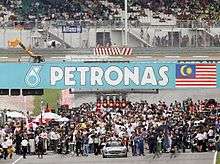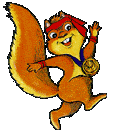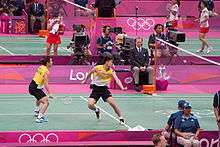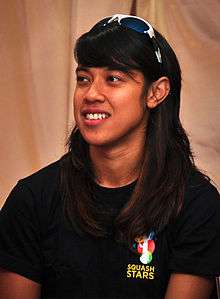Sport in Malaysia
 Life in Malaysia |
|---|
|
Sports in Malaysia are an important part of Malaysian culture. Sports in Malaysia are popular from both the participation and spectating aspect. Malaysians from different walks of life join in a wide variety of sports for recreation as well as for competition. In the broadest definition of sports — physical exercise of all sorts — the four most popular recreational sports among the general population of Malaysia are exercise walking, aerobic exercise, strength training, and running. Other most popular sports are bicycling, swimming, climbing, camping, bowling, hiking, fishing and scuba diving.
In the spectating aspect, the six spectator sports with most fans are association football, field hockey, rugby union, badminton, volleyball, handball, basketball and mixed martial arts.[1] Malaysia has hosted several major sports events including the Commonwealth Games in 1998.[2]
Individual sports
Outdoor sports
In the broadest definition of sports — physical exercise of all sorts — the four most popular recreational sports among the general population of Malaysia are exercise walking, aerobic exercise, strength training, and running. Most Malaysians live in housing areas with amenities such as public parks, pedestrian zone, health clubs and sport complexes nearby.[3]
Other most popular sports are bicycling, swimming, climbing, camping, bowling, hiking and fishing. Scuba diving is another recreation, particularly around the southeastern region of Sabah (on the island of Borneo).[4]
Racquet sports
The Malaysia national badminton team has won 6 silver medals and 2 bronze medals in badminton in the Olympic Games since the sport was first introduced to the Olympics in 1992. In 1992 Razif Sidek and Jalani Sidek won the bronze medal in men's doubles. In 1996, Rashid Sidek won the bronze medal in men's singles while Cheah Soon Kit and Yap Kim Hock won the silver medal in men's doubles. Lee Chong Wei won three silver medals in men's singles each in 2008, 2012 and 2016. In 2016, Chan Peng Soon and Goh Liu Ying won silver medals in mixed doubles while Tan Wee Kiong and Goh V Shem won silver medals in men's doubles.
In singles, the top men's shuttler is world number 1 Lee Chong Wei while Malaysia's best women's singles shuttler is Tee Jing Yi ranked world number 30 and trailed closely by junior shuttler Goh Jin Wei at world number 38. National top men's doubles pair, Tan Wee Kiong and Goh V Shem are placed world number 2 followed by Koo Kien Keat and Tan Boon Heong who are ranked world number 17 while the top women's doubles pair, Vivian Hoo Kah Mun and Woon Khe Wei are ranked world number 14 and mixed doubles pair, Chan Peng Soon and Goh Liu Ying are ranked world number 3 followed by world number 13 pair Tan Kian Meng and Lai Pei Jing in the BWF World Ranking (as of 3 November 2016).[5] The Malaysia national badminton team is ranked world number 6 in the BWF World Team Ranking (as of 3 November 2016).[6]
Malaysia has won the Thomas Cup, the world men's team trophy, five times since it was first contested in 1949 and has been runner-up nine times as of 2014. Malaysia also holds its own annual international badminton tournament, the Malaysia Open, now part of the Badminton World Federation's Super Series of top world class events.
Squash in Malaysia is governed by the Squash Racquets Association of Malaysia (SRAM). The Kuala Lumpur Open and Malaysian Open are annual squash tournaments held in Malaysia. The Malaysia men's national squash team has reached the quarterfinal stage at the World Team Squash Championships six times. The men's team has won the Asian Squash Team Championships three times. The Malaysia women's national squash team has won the silver medal once and bronze medal at the World Team Squash Championships four times. The women's team has won the Asian Squash Team Championships seven times.
Nicol David is an eight-time world champion and ranked world number 1 in woman squash since 2006.[7] Her compatriots Low Wee Wern and Delia Arnold are ranked world number 7 and 28, respectively in the WSA World Rankings (as of January 2015).[7] Male squash players Mohd Nafiizwan Adnan and Ong Beng Hee are ranked world number 32 and 34, respectively in the PSA World Rankings (as of January 2015).[8]
Precision sports
Hizlee Rais is ranked world number three in the World Bowls Singles Ranking List (as of 20 April 2013).[9]
Cycle sports
In 2016, Azizulhasni Awang made history for winning the first Olympic bronze medal in a cycling event. Malaysia hosts two international road cycling tours: the annual Tour de Langkawi and Jelajah Malaysia. Both races are part of the UCI Asia Tour. The Tour de Langkawi is the biggest cycling event in Asia and it is the one of five two hors-category (2.HC) classified races in Asia. The Jelajah Malaysia is the oldest bicycle race in Malaysia, touring around Malaysia.
Track cycling is a growing sport in Malaysia. Malaysia has several velodromes such as Cheras Velodrome and Velodrome Rakyat. Extreme cycling, such as mountain biking and urban freestyle BMX is also popular among youth in main cities in Malaysia. Riding bicycles is considered a mode of transportation as well as a recreational and leisure sport.
Azizulhasni Awang, Josiah Ng, Mohd Rizal Tisin, Fatehah Mustapa and Jupha Somnet are among the top track cyclists in Malaysia. Loh Sea Keong won the general classification and Asian rider classification at the 2013 Jelajah Malaysia. Mohamed Harrif Salleh and Mohamed Zamri Salleh won the points classification and mountain classification respectively at the 2013 Jelajah Malaysia.
Water sports
Pandelela Rinong took a bronze medal in 10-metre platform event at the 2012 Summer Olympics. She became the first female Malaysian athlete to win a medal at the Olympics, as well as the first to win an Olympic medal in any sport other than Badminton. Bryan Nickson Lomas, Yeoh Ken Nee, Leong Mun Yee, Cheong Jun Hoong and Traisy Vivien Tukiet are among the top divers in Malaysia.
Extreme sports
Abdil Mahzan was the leader of 2012 World Cup Points final standings.[10] Abdil Mahzan earned the title of IGSA World Cup Series Champion in the street luge event.[11] His personal best maximum speed is 131 km/h, achieved at the 2011 IGSA World Championship in Teutonia, Brazil.
Endurance sports
Malaysia host some international marathon event such as the Kuala Lumpur Marathon, Borneo International Marathon and Penang Bridge International Marathon.
Combat sports
The indigenous martial art of Silat is widely practiced throughout Malaysia. Among Malaysian Chinese and Malaysian Indians, a wide variety of Chinese and Indian martial arts is also popular, such as the art of Silambam among Malaysians of Tamil Indian origin.
In the northern states of peninsular Malaysia, i.e. Perlis, Kedah, Kelantan and Terengganu, which were historically influenced by the neighbouring Thai culture, the Thai national sport of Muay Thai is traditionally being practiced. Locally, it is known as Tomoi, which is the Malay rendition of the term Toi Muay (Thai: ต่อยมวย, rtgs: toi muai), an alternative name for Muay Thai.
Motor sports

Malaysian Grand Prix (Formula One), A1 Grand Prix and Malaysian motorcycle Grand Prix are held at the Sepang International Circuit.
Malaysian Grand Prix was first included in the Formula One World Championship in 1999. Since then, it has been held annually at the Sepang International Circuit in Sepang, Malaysia.
A1 Team Malaysia was the Malaysian A1 Grand Prix team. Alex Yoong and Fairuz Fauzy are among the top race car drivers in Malaysia.
Malaysian motorcycle Grand Prix is part of the Grand Prix motorcycle racing season. Zulfahmi Khairuddin is the top Malaysian motorcycle racer.
Team sports
Football
The Malaysia national football team (nicknamed Harimau Malaysia) represents Malaysia at an international level. The national team captured the country's first major international football title when they became the champion of 2010 AFF Suzuki Cup. The Malaysia national under-23 football team won a gold medal in 2009 and 2011 Southeast Asian Games. The Malaysia national team has qualified for the Asian Cup in 1976, 1980 and 2007 AFC Asian Cup, however,they have never been able to go through tonext stage. In the FIFA World Rankings, Malaysia's highest standing was in the first release of the figures, in August 1993, at 75th. It is ranked 171th in the world and 31th in Asia (as of 7 February 2016).[12] The Malaysia women's national football team is ranked 88th in the world and 17th in Asia in the FIFA Women's World Rankings (as of 19 December 2014).[13]
The Football Association of Malaysia (FAM) is the governing body for football in Malaysia. The home stadium of Malaysia national football team is the Bukit Jalil National Stadium. Malaysia Super League, Malaysia Premier League and Malaysia FAM League is a professional football league in Malaysia. Some of the major teams include: Melaka United, Kelantan FA, Terengganu FA, Selangor FA, Penang FA, Kedah FA, Perak FA, Johor Darul Ta'zim F.C., Kuala Lumpur FA and Negeri Sembilan FA. Johor Darul Ta'zim as the 2015 Malaysia Super League champions and the 2016 Malaysia FA Cup. Johor Darul Ta'zim F.C. became the only club from Malaysia to become the AFC Cup champion after beating F.C. Istiklol 1-0 in 2015.
Hockey
The Malaysia national field hockey team is Malaysia's representative in field hockey tournaments around the world. In the usual course of things, the team is made up of the best field hockey players in Malaysia. The governing body for the sports is the Malaysian Hockey Confederation. The Malaysia Hockey League (MHL) is a top league competition for field hockey clubs in the Malaysian hockey league system.
At the present time, the men's hockey team is ranked 13th in the world and 4th in Asia in the FIH World Rankings (as of 16 June 2014).[14] The team won a silver medal in 2010 Asian Games. The Malaysia women's national field hockey team is ranked 21st in the world and 5th in Asia in the FIH World Rankings (as of 16 June 2014).[14]
Netball
The Malaysia national netball team represents Malaysia in international competition. Malaysian Netball Association is the governing body for netball in Malaysia. The team is ranked 23rd in the world and 2nd in Asia in the INF World Rankings (as of 31 October 2014).[15]
Rugby union
The Malaysia national rugby union team represents Malaysia in international rugby union. The governing body is the Malaysian Rugby Union. The team is ranked 62nd in the world and 6th in Asia in the IRB World Rankings (as of 5 January 2015).[16] Malaysia have yet to make their debut at the Rugby World Cup, but have attempted to qualify since the South African World Cup in 1995. MRU Super League is the top flight of rugby union league in Malaysia.
Sepaktakraw
Sepaktakraw in Malaysia is governed by Persatuan Sepaktakraw Malaysia (PSM). The men's team is ranked world number two in the ISTAF World Ranking (as of 13 November 2014).[17] The women's team is ranked world number three in the ISTAF World Ranking (as of 13 November 2014).[18]
Major sport events

Malaysia participates in international sporting event such as the Olympic Games, the Asian Games, the Commonwealth Games and the Southeast Asian Games. Malaysia has hosted the 1998 Commonwealth Games and came in fourth place in the medal tally. Malaysia also has hosted Southeast Asian Games five times and has become the overall champion in the gold medal tally in the 2001 Southeast Asian Games. Malaysian athletes have won a total of eleven Olympic medals, in badminton, cycling and diving.[19]
National Sports Day
The National Sports Day (Malay: Hari Sukan Negara) is a national sports day in Malaysia, held annually on the second Saturday in October, with the main objective of promoting a healthy lifestyle among its population. The first National Sports Day was held in 2015.[20]
Sukma and Malaysia Para Games
The Sukma Games are a biannual event in Malaysia. The event was first held in 1986, and held every two years. Selangor become the sport powerhouse in Malaysia sport industry followed by Sarawak, Perak, Pahang, Penang, Terengganu, Johor, Sabah, Kedah, Federal Territory, Negeri Sembilan, Malacca, Kelantan and Perlis based on the all-time medal table.
The Malaysia Para Games is a national sports meet in Malaysia, patterned after the Paralympic Games and held at the venue where Sukma Games last held.
Olympics and Paralympics
Malaysia first participated at the 1964 Summer Olympics, and has sent athletes to compete in every Summer Olympic Games since then, except the 1980 Summer Olympics, which it boycotted. Malaysia has never participated in the Winter Olympic Games. Olympic Council of Malaysia is the National Olympic Committee for Malaysia. Malaysian athletes have won a total of eleven medals at the Summer Olympic Games. Eight medals have been won in badminton, two medals have been won in diving and one medal has been won in cycling.
Malaysia made its Paralympic Games debut at the 1972 Summer Paralympics. The country was then absent for three consecutive editions of the Summer Paralympics, before making its return at the 1988 Summer Paralympics. Malaysia has participated in every subsequent edition of the Summer Paralympics, but has never entered the Winter Paralympics. Malaysian Paralympic Council is the National Paralympic Committee for Malaysia. Malaysian athletes have won a total of seven medals at the Paralympic Games: three gold, two silver and five bronze.
Hosted sports competitions
|
|
|
Association football
|
Athletics
|
Badminton
|
|
Baseball
|
Basketball
|
|
|
|
|
|
Golf
|
|
|
|
|
|
|
|
Sailing
|
|
|
Tennis
|
|
|
Sport media in Malaysia
On 28 July 1984, TV3 became the first commercial channel in collaboration with RTM bringing Malaysians the live coverage of the Los Angeles Olympics. The live coverage for multi-sport events and international championships always been done since then.
On 25 March 2010, Astro Arena, the country's first local sports channel went on air. Astro Arena (Channel 801) a 24-hours local sports channel will be delivered predominantly in Malay and available to all Astro customers under its Family Pack. Astro Arena is featuring live local sports, a comprehensive 7-day a week coverage of local and international sports news, informative magazine and information programming and interactive viewer involvement.
See also
References
- ↑ "Sports Malaysia". Tourism Malaysia. Retrieved 29 September 2010.
- ↑ Dudley, Rueben (20 September 2010). "19th Commonwealth Games: Doing Malaysia proud". Petaling Jaya, Selangor: The Malay Mail. Retrieved 29 September 2010.
- ↑ A Design Guide of Public Parks in Malaysia, Penerbit UTM, 2002, pp. 66–, ISBN 978-983-52-0274-2
- ↑ "10 best dive locations in Malaysia | FAQ | Wonderful Malaysia". Retrieved 2015-10-08.
- ↑ "BWF World Ranking". Badminton World Federation. Retrieved 29 May 2014.
- ↑ "BWF World Team Ranking". Badminton World Federation. Retrieved 29 May 2014.
- 1 2 "WSA World Rankings". Women's Squash Association. Retrieved 8 January 2015.
- ↑ "Dunlop PSA World Rankings". Professional Squash Association. Retrieved 8 January 2015.
- ↑ "World Bowls Singles Ranking List Top 16". World Bowls Ltd. Retrieved 20 April 2013.
- ↑ "2012 World Cup Points – Final Standings". IGSA. Retrieved 30 December 2012.
- ↑ "IGSA World Cup Series Champions". IGSA. Retrieved 30 December 2007.
- ↑ "The FIFA/Cola-Cola World Ranking – FIFA.com". FIFA. Retrieved 8 January 2015.
- ↑ "The FIFA Women's World Ranking – FIFA.com". FIFA. Retrieved 8 January 2015.
- 1 2 "World Ranking – International Hockey Federation". International Hockey Federation. Retrieved 8 January 2015.
- ↑ "INF World Rankings". International Netball Federation. Retrieved 8 January 2015.
- ↑ "World Rugby Rankings". International Rugby Board. Retrieved 8 January 2015.
- ↑ "ISTAF World Ranking – Men's Ranking". International Sepaktakraw Federation. Retrieved 8 January 2015.
- ↑ "ISTAF World Ranking – Women's Ranking". International Sepaktakraw Federation. Retrieved 8 January 2015.
- ↑ "Previous Olympic Games Medal Tally", Olympic Council of Malaysia
- ↑ "Students, teachers nationwide participate in National Sports Day | New Straits Times | Malaysia General Business Sports and Lifestyle News". Retrieved 2015-10-10.
External links
| Wikimedia Commons has media related to Sports in Malaysia. |
- Ministry of Youth & Sports Malaysia
- National Sports Council of Malaysia (NSC)
- sportsmalaysia.net
- List of sports association in Malaysia
- Sport in Malaysia at The Encyclopedia of Malaysia
Further reading
- Lamartine Pereira da Costa; Ana Miragaya (2002), Worldwide Experiences and Trends in Sport for All, Meyer & Meyer Verlag, pp. 79–, ISBN 978-1-84126-085-3
- Sport for All in Malaysia: Policy and Practice, University of Malaya Press, 2005, ISBN 978-983-100-269-8





